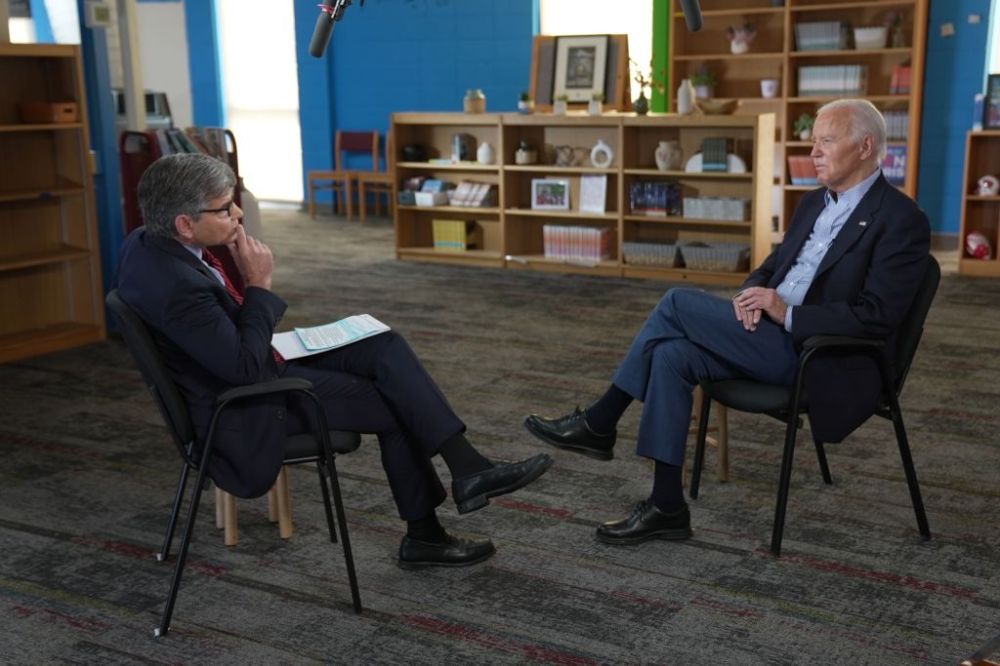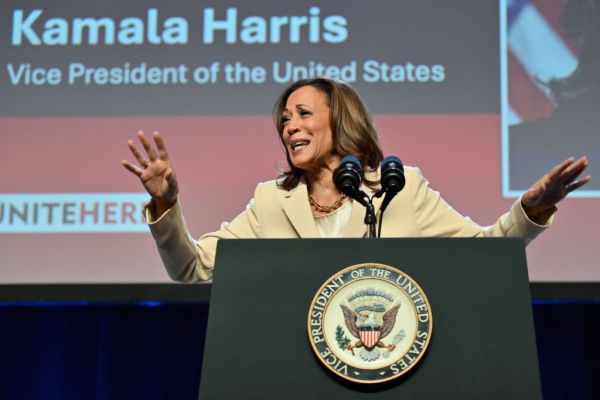On Friday, a few hours before the president’s interview with George Stephanopoulos, I listened to a podcast in which the hosts proudly predicted that a decent man and patriot like Joe Biden would do the right thing for his country by withdrawing as his party’s nominee.
And I thought, “If Joe Biden were decent or patriotic, he would have withdrawn the moment the true extent of his infirmity became apparent to him and his inner circle.”
It’s unclear precisely when that moment arrived, but each new day brings fresh reporting that pushes the timeline back. For those who know him well, alarms evidently began ringing long before 9 p.m. ET on June 27.
I turned on the Stephanopoulos program later and watched with wonder as this exchange played out.
STEPHANOPOULOS: And if you stay in and Trump is elected and everything you're warning about comes to pass, how will you feel in January?
BIDEN: I'll feel as long as I gave it my all and I did as good a job as I know I can do, that's what this is about.
That was the second time in eight days that the president made fools of his voters.
The first was at the debate, of course, when those of us who believed he was as diminished as any 81-year-old discovered he was quite a bit more diminished than that. But his response in the clip above is worse: If you view the stakes in November as a choice between the constitutional order and authoritarianism, you were jolted by the realization that the president doesn’t share your sense of urgency.
For all the heavy breathing he and Democrats do about democracy being on the ballot, he seems to prefer hanging on as nominee, losing, and collecting his participation trophy to doing everything necessary—including making way for a more capable candidate—in the name of defeating Donald Trump.
On Monday morning, with a Democratic revolt in Congress brewing, he released a letter to lawmakers affirming that he won’t quit the race. Later, he phoned into Morning Joe and all but threatened to burn the party down if the efforts to replace him persisted. “The voters—and the voters alone—decide the nominee of the Democratic Party,” he warned, daring would-be usurpers to challenge him at the convention. “I am not going anywhere.”
As of noon on January 20, 2021, I thought we were done having to pay attention to presidential psychodrama every day in order to discern how stable America is or isn’t. Thanks to Biden, the man who promised to restore normalcy, we are not.
“For nearly 40 years, Joe Biden has been dedicated to fighting on behalf of his number one issue, which is Joe Biden being the president,” New Republic editor Osita Nwanevu tweeted after the Morning Joe segment. Anyone who talked themselves into believing Biden’s cause was nobler than that, as I did, is a fool and has now been made to feel like one.
One way or another, Joe Biden’s absurdly long political career will be over by January 20 of next year. He’s actively choosing to end it in the most humiliating, destructive, and villainous way possible.
The remarkable thing about the president’s heel turn from anti-Trump champion to prideful midwife of a Trump restoration is how Trumpy it’s been. Time and again over the last two weeks, he and his cronies have borrowed political tactics from his enemy’s playbook.
And I don’t just mean slathering his face with bronzer to make him seem more “vigorous.”
Whenever Trump’s fragile ego is confronted with a harsh reality that it can’t bear, he protects it by retreating into denial. The same is true of Biden lately. When Stephanopoulos asked him what his plan was to turn the campaign around, the president dodged by boasting about the size of his crowds—which sounds familiar. When he was confronted with the numerous polls showing him trailing, he scoffed and insisted that “All the pollsters I talk to tell me it’s a toss-up.”
Fake news, in other words.
Trump relies on unqualified family members as top advisers and is quick to scapegoat deputies for his failures. Joe Biden has also relied on unqualified family members to advise him on how to move forward post-debate, with his son Hunter reportedly crashing meetings between the president and his aides. (“What the hell is happening?” one source wondered to NBC News.) Hunter and Jill Biden have allegedly urged Joe to fight on to November while conniving to scapegoat his deputies for his debate performance.
Oh, and remember when Trump infamously said of America’s problems in 2016 that “I alone can fix it”? That also turns out to be the Biden family’s position on Joe in 2024. “Joe isn’t just the right person for the job. He’s the only person for the job,” Jill Biden said at an event shortly after the debate. The president himself ended his interview with Stephanopoulos in a similar manner.
Who’s gonna be able to hold NATO together like me? Who’s gonna be able to be in a position where I’m able to keep the Pacific Basin in a position where we’re—we’re at least checkmating China now? Who’s gonna—who’s gonna do that? Who has that reach? Who has—who knows all these pe …?
That’s a rare case of a nominee implicitly arguing that voters should prefer him to his running mate as much as they should prefer him to his actual opponent. Joe alone can fix it. Not Kamala Harris.
And of course, no Trump comparison would be complete without a theatrically combative White House press office that withholds damaging information from the press and then affects righteous indignation when asked legitimate questions about it:
Where Biden really resembles Trump, though, is the degree to which he’s apparently willing to bully the establishment of his party and risk wrecking its chances of winning the presidency if it seeks to replace him as leader.
As I’ve noted repeatedly these past few years, the essence of the Republican hostage crisis is that it’s more important to Trump and his movement to control their party than to control the government. They would rather monopolize primaries and lose to Democrats in the general election than stand aside for more electable Republican candidates to help the right win power. The price of denying them that control is murder-suicide: Nominating Ron DeSantis or Nikki Haley this year likely would have led Trump and his diehards to withhold their support from the GOP in November, assuring a Republican wipeout.
Isn’t that what Joe Biden is now proposing for his own party if they replace him? A murder-suicide?
Biden lacks the cultish devotion needed to bring about a true political Jonestown of the sort Trump might engineer, but he’s doing everything he can to delegitimize the effort to find a more electable nominee. His letter to congressional Democrats stresses that ousting a duly elected party nominee would be anti-democratic, as much an affront to the party’s voters as it would be to him personally. And he’s planning to lean heavily on his African American base for support during this crisis, knowing how wary party leaders will be to thrust the party into a racially tinged argument over “disenfranchisement” so soon before November.
I will make this as painful for you as I can, the president is telling his Democratic critics. If they try to end his presidential campaign, he’ll nurse a sense of betrayal among his supporters that risks a disaster for the left at the polls.
As of today, like Trump, Biden rules his party’s establishment not by affection but by fear. And like Trump, he’s not above lowbrow demagoguery aimed at “elites” to bind his grassroots supporters tightly to him.
The last trick in the Trump playbook is to cultivate intense loyalty among supporters by encouraging apocalyptic despair at the thought of the other party prevailing. That’s a no-brainer for Joe Biden to borrow, as a Trump restoration really could mean doom for the constitutional order.
The point of the “Flight 93 election” nonsense in 2016 was to minimize Trump’s many moral failings by getting Republican voters to weigh them against the end of the republic as we know it. No matter how many misgivings you might have had about the Republican nominee, you were encouraged to learn to live with them knowing that defeat would assure America’s extinction.
Biden is now using the same logic to justify sticking with him despite his infirmity—and he’s not being subtle about it. “Any weakening of resolve or lack of clarity about the task ahead only helps Trump and hurts us,” he wrote in his new letter after reminding his party of his opponent’s role in the January 6 attack on the Capitol. Democrats can either unite behind Joe or they can fracture and bring about the end of the republic as we know it, but Biden is going to make them pick one or the other. There’s no third option.
If you doubt how effective catastrophism can be in inculcating an ethic of party unity (and why would you doubt it after eight years of Trump?), witness the phenomenon of (gulp) “blue MAGA” on social media this week. Numerous liberals have declared their intention to vote for Biden over Trump as the lesser of two evils no matter how disabled he becomes or how embarrassing his behavior might be. And while I share their sentiment generally, it’s … not opportune at a moment when Democrats have a chance to replace the president with a more capable and electable person.
The idea of “blue MAGA” is true to the spirit of this political era, though. Once again, instead of reckoning honestly with their leader’s unfitness for office, a party’s rank-and-file is rationalizing his flaws, scapegoating allies who dare to point them out as “disloyal,” and demanding that everyone get back to storming the cockpit in order to prevent the plane from crashing. Democrats are speedrunning the Access Hollywood episode from 2016.
I suspect that, deep down, Biden’s defenders are angry at him for having misled them about his condition for so long yet feel forced by the pressures of a high-stakes election to redirect their anger at targets who are politically safer to attack. Either way, like Donald Trump, Joe Biden cannot fail. He can only be failed.
The thing is, this isn’t the Access Hollywood episode.
That happened a month before the 2016 election, long after the GOP convention. There was no time to reprint ballots. And there was reason for right-wingers to think (or hope) that no additional recordings of Trump being his obnoxious self would surface. Diehard Republicans had little choice but to weather the storm and pray that it would pass before Election Day—although, even in those difficult circumstances, some did try to engineer a change of nominee.
Today, Democrats do still have a choice. The election is four months away; Biden hasn’t officially been chosen as nominee; no ballots have been printed. The president could extricate his party from this crisis relatively gracefully if he wanted to by withdrawing. He’s choosing not to because he’d rather be the head of his party for six more months than maximize its dwindling chances of preventing a second Trump catastrophe.
His infirmity isn’t a storm that will pass either. There might not be any further political hurricanes as strong as the Category 5 we saw at the debate, but then again there might be—at any moment. Certainly, there will be lesser storms of the sort we’ve been seeing for months. Each one will be a reminder of that Category 5, and each public appearance will be a hold-your-breath affair in which the president’s basic ability to function like any other candidate will be the main storyline. If he does? Great, bare minimum met. And then the next hurricane watch will begin.
Already, well-placed sources are whispering to the media that they’re not sure who’s in charge of policy in the West Wing. A senior White House official, who presumably works in close quarters with the president himself, told the New York Times this weekend that Biden has declined “in recent months” and should withdraw from the race. An election that was supposed to be about Trump will, going forward, be an election about which neurological disorder a historically unpopular incumbent may or may not have.
That storm will rage until Election Day. Biden’s presidential chances won’t survive it.
His complaints about the will of the voters of his party are also disingenuous and misplaced.
Biden didn’t win this year’s primary because Democrats are excited to see what sort of policy magic an 86-year-old might make in his second term. Both before and after the debate, huge numbers of American voters said the party should have a different nominee. The president prevailed in the primary because anyone who might have seriously challenged him was too frightened to try. The prospect of a bitter race splitting the left and enabling a Trump victory guaranteed that the most formidable contender Biden would face was Dean Phillips.
Even then, had the party known the full extent of his debilitation, a serious opponent presumably would have emerged in order to spare Democrats from having to gamble the fate of the constitutional order on Joe Biden’s collapsing cognitive health. But that opponent never came because the White House aggressively deceived Americans on that subject.
Biden defrauded his party, depriving primary voters of a fully informed decision, and now he’s touting the success of that fraud as a reason for why he should be allowed to get away with it.
There’s a third absurdity to this fiasco, though: By now it should be clear to all that Kamala Harris, more so than Biden himself, is the “real” nominee this fall.
Republicans have made that point for months, but whatever shred of hope remained that the president might complete a second term evaporated on the debate stage on June 27. Joe Biden might live until January 2029, but it’s inconceivable that he’ll be able to do the job until then. If he’s reelected, Harris will assuredly assume the presidency at some point.
So why not make her the nominee now and give Americans an honest choice? Asking them to reelect Joe Biden to a four-year term he certainly won’t complete is asking for their complicity in a second fraud.
I resent that I’m being asked to participate in it. And if I resent it, imagine how swing voters who don’t view Trump as some sort of providential judgment on America feel.
This all feels like an enormous waste of time, and Democrats don’t have time.
If Biden suffers another significant “senior moment,” the outcry of exasperation within the party might finally force him to face reality and withdraw. That could happen in a week, or a month. Or, if that senior moment is especially disastrous, even in the fall. Ballots bearing the president’s name might already have been printed by then.
As I write this, Biden is effectively demanding that members of his party who’ve spent two weeks loudly questioning whether he’s still fit for the job somehow put all of that rhetorical toothpaste back in the tube. But even if they can do it (which they can’t), it’ll all come spilling out again the next time he suffers a cognitive event—possibly anonymously but spilling out all the same.
If Biden doesn’t suffer another significant senior moment, but rather a series of sporadic smaller ones on the trail, his candidacy will limp on to November and he’ll likely lose handily to Trump. Democratic leaders won’t dare try to replace him against his will, though: Even if that’s feasible at the convention under party bylaws, the rancor and recriminations it would cause would probably doom Biden’s replacement and possibly cause a liberal disaster down the ballot.
Instead, Democratic leaders will go on vouching for his fitness insincerely until Election Day, with all the corrupting Trumpy consequences that entails. “That can have corrosive effects beyond just potentially losing an election,” Benjy Sarlin noted at Semafor. “It breeds suspicion and cynicism inside and outside the party and ties elected Democrats to any future revelations about his health.”
The president’s either going to waste his party’s precious time by trying to hang on before being replaced anyway, or he’s going to waste everyone’s time by hanging on to Election Day and losing. Even with an alternative as loathsome as Trump on the ballot, I can’t imagine Americans voting for a man whom they no longer believe has the basic cognitive wherewithal to execute the duties of the office.
It’s all Joe Biden’s fault. His legacy will be vanity, demoralization, and authoritarianism.







Please note that we at The Dispatch hold ourselves, our work, and our commenters to a higher standard than other places on the internet. We welcome comments that foster genuine debate or discussion—including comments critical of us or our work—but responses that include ad hominem attacks on fellow Dispatch members or are intended to stoke fear and anger may be moderated.
With your membership, you only have the ability to comment on The Morning Dispatch articles. Consider upgrading to join the conversation everywhere.